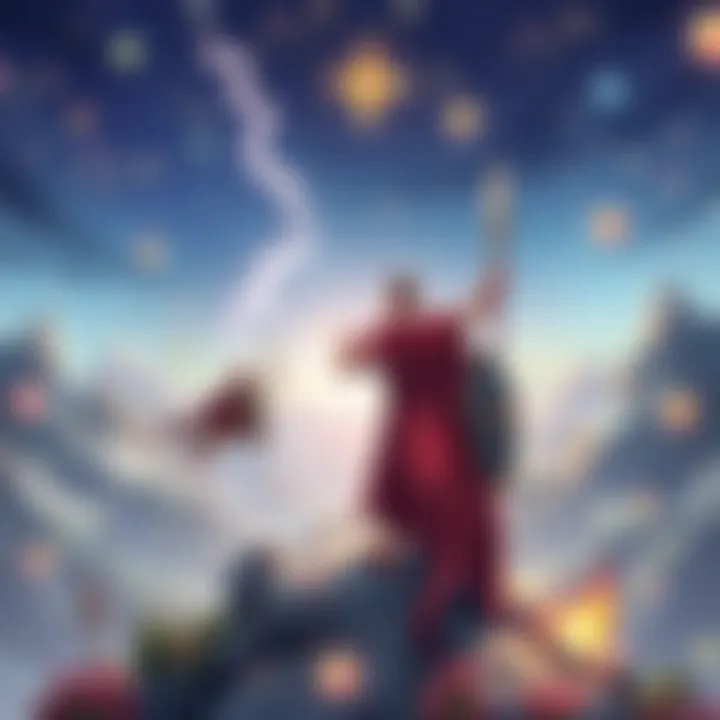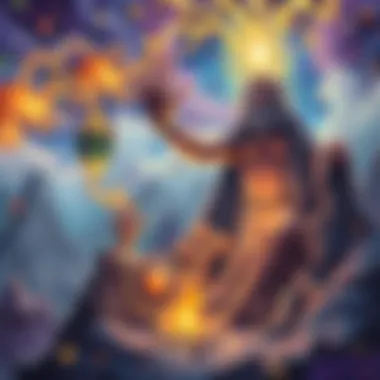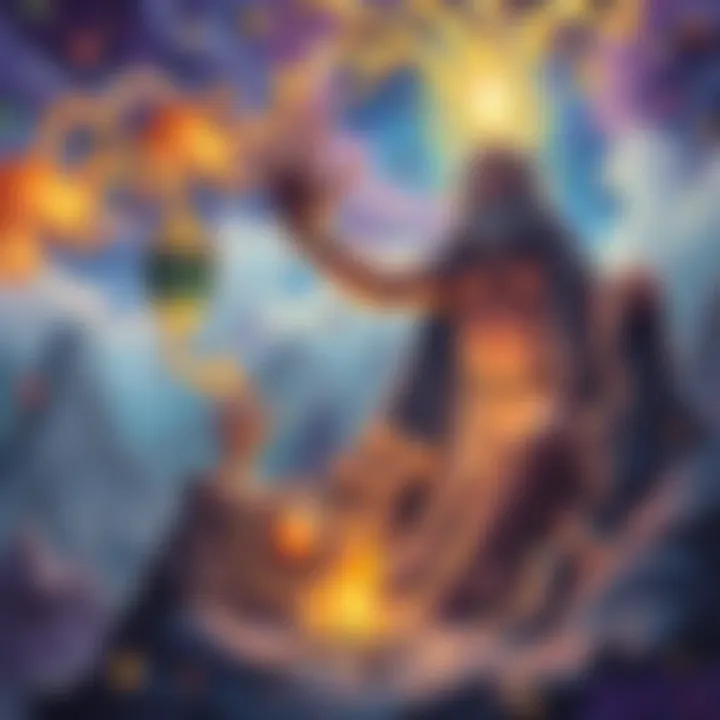Exploring the Power of Myth: Insights from Joseph Campbell


Intro
Joseph Campbell, an influential scholar, left a mark on the understanding of myth and its significance in human life. His work, particularly in The Power of Myth, speaks volumes about how stories and archetypes shape our experiences. Campbell's insights can facilitate a deeper understanding of one’s life purpose and the broader patterns in society. This article will delve into his ideas, exploring the hero's journey, various archetypes, and the transformative nature of storytelling.
Categories of Life-Changing Books
In navigating the landscape of personal development and transformative storytelling, categorizing the books can illuminate pathways of insight and understanding. There are two significant categories worth exploring: self-help books and fiction that discusses transformative themes.
Self-Help and Personal Development
Self-help books often furnish readers with practical frameworks for navigating life challenges. Books that resonate with Campbell’s ethos might include:
- The Alchemist by Paulo Coelho, encouraging readers to follow their dreams.
- Awaken the Giant Within by Tony Robbins, urging individuals to take control of their lives.
- Man’s Search for Meaning by Viktor Frankl, underscoring the search for purpose even amidst harrowing circumstances.
These texts reflect some of the archetypes Campbell and others have identified—of the hero in pursuit of transformation.
Fiction with Transformative Themes
Literature often mirrors the struggles we face and offers narratives we can connect with deeply. Fiction that encapsulates transformative themes aligns beautifully with Campbell's viewpoints. Examples include:
- Life of Pi by Yann Martel, a tale of survival interwoven with deep spiritual exploration.
- The Hobbit by J.R.R. Tolkien, which captures a classic hero’s journey.
- The Little Prince by Antoine de Saint-Exupéry, urging readers to recognize the essence of love and friendship.
These works often reflect the inner journeys that Joseph Campbell posits in his discussions on myth.
Book Summaries and Insights
To tap into the wisdom found in such books, summarizing their key takeaways will highlight how to apply these insights in everyday life.
Key Takeaways from Popular Titles
- Archetypes: Recognizing patterns in characters that resonate universally.
- Hero’s Journey: A framework for understanding personal challenges as quests.
- Personal Growth: Emphasis on action-oriented advice fosters change.
How to Apply Insights in Daily Life
Gleaning insights from these narratives can change how individuals navigate their realities. Consider these steps to incorporate lessons into daily living:
- Reflect: Take time for introspection to identify your own hero's journey.
- Engage: Read with an eye for application, asking how insights can shape your daily decisions.
- Connect: Discuss stories with others, fostering deeper understanding and community connections through shared mythical experiences.
By integrating Campbell's teachings into contemporary life and bridging myth with everyday experiences, we come to appreciate the enduring power of storytelling and its implications on our paths to personal development.
Preface to Joseph Campbell
Joseph Campbell stands as a towering figure in the study of mythology, bridging ancient narratives with modern human experience. His thoughts invite individuals to explore their connections to stories that have shaped cultures over centuries. Understanding Campbell is like peering into a labyrinth: each turn brings fresh insights into the nature of myth and its enduring relevance in our lives.
Background of Campbell's Career
Joseph Campbell was born in 1904 in New York City and exhibited a keen interest in mythology from a young age. His diverse educational background, which included a degree from Dartmouth College and further studies at Columbia University, laid the groundwork for his future work. Early on, Campbell immersed himself in the works of mythologists, psychologists, and anthropologists, which influenced his conceptual frameworks.
Throughout his career, Campbell traveled extensively, studying various mythologies across the globe. His experiences, from the cliffs of Ireland to the temples of India, enriched his understanding and deepened his belief in the universal motifs that connect humanity. He faced various commercial rejections in his early writing endeavors, yet his persistence proved fruitful. Notably, his book The Hero with a Thousand Faces, published in 1949, established him as a prominent voice in the field. It introduced the idea of the "monomyth" or the Hero's Journey, asserting that many stories share similar structural elements, regardless of their cultural origins.
In the years that followed, Campbell became a sought-after lecturer and a popular figure in the realm of public discourse on mythology, culminating in the landmark PBS series The Power of Myth. This series opened up an audience of millions to the significance of mythology, focusing on its role in both ancient and modern life. Through his explorations, Campbell transformed how we perceive narratives, emphasizing that stories serve not just as entertainment but as crucial elements of human self-understanding and growth.
Significance of 'The Power of Myth'
The Power of Myth is not merely a title; it's a concept that underlines the essential role of storytelling in human life. Campbell eloquently argues that myths act as a lens through which we can examine our realities, aspirations, and fears. The themes explored within the series illuminate how myths embody our values and beliefs, serving as cultural compasses throughout time.


The compelling discussions in The Power of Myth encompass various dimensions of human experience, such as love, death, and the quest for meaning. Campbell's dialogue partners, including well-known figures like Bill Moyers, amplify these intricate themes, making them accessible and relatable. The series encourages viewers to look inward, sparking curiosity about their personal narratives while drawing connections to ancient archetypes.
Moreover, by examining myths, Campbell fosters a greater understanding of the collective unconscious—a shared reservoir of memories, dreams, and symbols that shapes societies. This concept is vital for comprehending how myths continue to play a role in modern storytelling mediums, from films and novels to video games. The significance of The Power of Myth stretches beyond academia; it beckons individuals to consider their stories and struggles, urging them to embrace the hero within.
"Myths are clues to the spiritual potentialities of the human life." - Joseph Campbell
Through Campbell's lens, mythology is not an artifact of the past but a living influence that guides individuals in navigating their journeys today. Understanding his work provides invaluable insight into how we all engage with stories, illuminating the paths we take in our existential quests.
Understanding Mythology
Mythology plays a crucial role in understanding the cultural fabric of human societies. It goes beyond mere stories and fables; it's a way for people to navigate through the complexities of life. Each myth holds a mirror to the truths of existence, revealing how different cultures interpret the universe and their place within it. These narratives help bind communities and provide a framework for personal and collective identity.
In the context of Joseph Campbell's work, especially highlighted in The Power of Myth, mythology is perceived as a fundamental part of human experience. Here, the exploration of myths gets translated into an understanding of shared human experiences, aspirations, and fears. By examining the essence of mythology, we can discern the wisdom passed down through generations and how it still resounds in our modern lives.
Definition and Function of Myth
At its core, a myth serves multiple purposes. It can be defined as a traditional story that explains natural or social phenomena, often involving heroic characters or supernatural beings. Think of it as the root of many cultures, serving as the fabric from which traditions, beliefs, and values are woven together. Myths are not just fanciful tales but rather essential narratives that shape identities and morals.
The functions of myth can be categorized into several key dimensions:
- Explaining the Unknown: Myths often provide explanations for the mysteries of life. Whether it is the creation of the world or the essence of love, mythological stories fill the gaps in human understanding of the universe.
- Cultural Identity: Myths help reinforce cultural norms and values. They teach us how to behave, what to believe, and who we are as part of a larger community. For instance, the hero's journey, a prevalent motif, often illustrates the trials one must go through to gain wisdom or strength.
- Psychological Insight: Myths often embody psychological truths that resonate with individuals on a deeper level. Carl Jung's notion of archetypes stems from this; certain characters might trigger familiar feelings, helping people understand their own struggles and ambitions.
Evolution of Myths in Human Culture
The evolution of myths is a fascinating journey that reveals how human thought and societies have transformed over time. Myths have been essential in societies from ancient civilizations to contemporary cultures. As we journey through history, we can see how myths have adapted and evolved.
- Ancient Civilizations: In times long past, myths served as a way to explain natural phenomena, such as thunderstorms or agricultural cycles. For example, the ancient Greeks crafted stories of gods like Zeus to explain the unpredictability of nature and human existence.
- Cultural Adaptation: As cultures come into contact with one another, myths often merge, creating hybrid stories that reflect a blend of traditions. This process can be seen in the storytelling of folktales where the essence of one culture's hero may shift after being paired with another's mythology.
- Modern Reinterpretation: In contemporary culture, myths are not confined to folklore. Films, literature, and other media continue to perpetuate mythic structures, though they may appear in forms more suited to modern sensibilities. For example, superhero narratives in comic books embody the hero’s journey, akin to ancient myths, illustrating timeless human experiences within a fresh context.
The study of the evolution of myths provides valuable insight into how societies change and what remains constant across time and culture. It underscores the enduring power of storytelling as a means to convey essential truths about existence, personal journeys, and shared humanity.
"Myths are the stories we tell to understand who we are and why we are here." - will reflect the essence of Campbell's examination of mythology.
In summary, understanding mythology not only enriches our knowledge of different cultures and societies but also aids in personal reflection and comprehension of our human experiences. The frameworks established by myths, including their definitions and functions, alongside their evolutionary journey, underscore their relevance in shaping personal and collective identities across time and space.
For additional insights on the significance of myths in cultural studies, you can refer to resources like Encyclopedia Britannica or the Wikipedia page on Mythology.
The Hero's Journey: A Central Theme
The concept of the Hero's Journey stands at the heart of Joseph Campbell's analysis of myths. This Framework acts like a roadmap for understanding not only ancient stories but also modern narratives. It provides a structure that helps decode the complexities of human experience through a familiar pattern of ups and downs, trials and triumphs. More than just a narrative arc, it possesses the power to resonate with each of us on a personal level, linking our own life struggles to the age-old tales of heroes who venture forth, face their fears, and return transformed.
The Hero's Journey encapsulates the human experience. It highlights the growth that comes through adversity, underscoring an essential truth: transformation is often rooted in challenges. By laying bare the internal conflict and subsequent resolution central to the hero's arc, Campbell offers profound insights into personal development. This approach extends beyond the pages of books or frames of cinema; it speaks directly to individuals grappling with their own life challenges.
Stages of the Hero's Journey
The stages of the Hero's Journey can be understood as a series of steps that lead the protagonist from the ordinary world into the extraordinary. Campbell identified these stages, breaking them down into clear phases that reflect both the external journey within the broader world and the internal journey of self-discovery. They include:
- The Call to Adventure: The hero is invited to leave their mundane life behind, often prompted by a challenge or a quest that must be undertaken.
- Refusal of the Call: This stage addresses the fear and doubt that emerge before embarking on a new path.
- Meeting the Mentor: Here, the hero meets a figure that provides guidance and tools, empowering them to confront the journey ahead.
- Crossing the Threshold: The hero commits to the journey, leaving behind the familiar to confront the unknown.
- Trials, Allies, and Enemies: As the hero faces adversaries and forges alliances, they gather skills and resolve.
- The Approach to the Inmost Cave: At this pivotal point, the hero prepares for their greatest challenge, both externally and within themselves.
- The Ordeal: Facing a near-defeat or major crisis, the hero emerges transformed, having confronted their fears.
- The Reward: The hero gains newfound strength, wisdom, or treasure that will aid them in their journey back home.
- The Road Back: After achieving their goal, the hero must return to the ordinary world, often facing further trials.
- The Resurrection: The final test transforms the hero one last time as they reconcile their experiences.
- Return with the Elixir: The hero returns to their community, sharing their insights and transformations that can benefit others.
Understanding these stages allows readers to relate those fictional journeys to their own. It's a timeless structure that speaks to resilience and the necessity of personal evolution.
Cultural Variations of the Hero's Journey
While Campbell's structure of the Hero's Journey may seem universally applicable, it is essential to recognize its adaptations across cultures. Different societies infuse their vital values, beliefs, and histories into the journey of the hero.
For instance, in the myths from the Celtic tradition, heroes often continue on quests that blend into their cultural folklore, retaining elements of the community even in various trials. Think of how Arthurian legends weave in notions of chivalry and camaraderie, reflecting societal values.
Conversely, in many Indigenous narratives, the hero's journey is less about individual triumphs and more about communal harmony. Heroes emerge not only for their people but for the very spirit of the land. Take the tales of Native American traditions, where heroes often undergo journeys not just for personal gain but to restore balance to nature or society.


More contemporary narratives, like those in superhero films, pull more from Campbell's concept but are heavily influenced by modern anxieties and aspirations. Characters like Spider-Man or Wonder Woman provide insight into societal issues such as identity and responsibility, re-contextualizing ages-old mythic structures into relatable modern dilemmas.
In summary, the Hero's Journey serves not only as a lens for analyzing individual tales but also as an illustrative mirror reflecting the distinct cultural fabrics from which they originate. By examining these variations, one gains a more profound understanding of the complexities inherent in the human condition, as represented through storytelling across different societies.
Archetypes and Their Significance
The study of archetypes offers deep insights into the human experience. These universal patterns manifest in various narratives across cultures and time periods, showcasing that beneath our diverse surface lies a common thread of shared human sentiments. Joseph Campbell's work emphasizes these archetypes as central to understanding not only myths but also the way individuals and societies construct meaning. By decoding these patterns, we unearth profound truths about ourselves and the larger framework of existence. In a world increasingly characterized by complexity, archetypes serve as lenses through which we can interpret our lives and the narratives around us.
Definition of Archetypes
Archetypes can be seen as foundational symbols or motifs within narratives that resonate universally. They are not static; rather, they evolve and take on differing forms depending on the cultural backdrop. For instance, the figure of the Hero represents courage and the pursuit of self-discovery, while the Mentor embodies wisdom imparted through experience. These archetypes surface repeatedly in stories, transcending geographical boundaries. Put simply, they act like templates, guiding the way we interpret our journeys through life. Campbell delineates these patterns as a means to navigate the human experience, revealing how they shape our understanding of ourselves and each other.
Common Archetypes in Myths
Across various mythologies, certain archetypes hold a recurring presence, reflecting fundamental human experiences. Some of the most recognized archetypes include:
- The Hero: Embarking on a quest, overcoming obstacles, and returning transformed. Think of figures like Odysseus or Harry Potter.
- The Shadow: Representing the darker aspects of one's psyche or society. It challenges our growth; consider villains in classical tales.
- The Mentor: This archetype provides guidance and support, akin to Yoda from Star Wars or Merlin in Arthurian legends.
- The Mother: Often symbolizing nurturing and life, this archetype appears in various forms, from Gaia in Greek mythology to the Virgin Mary in Christian narratives.
These archetypes resonate deeply within us, each representing aspects of the human condition, serving as mirrors to reflect our fears, desires, and aspirations.
Psychological Impact of Archetypes
The impact of archetypes extends beyond literature; they fundamentally shape our psychology and conscious thought. According to Campbell, when we encounter these archetypes, they activate powerful emotions and provoke introspection. For instance, someone resonating with the Hero's journey may find themselves driven to confront their own struggles in a similar fashion. Moreover, these archetypes can act as tools for self-discovery, offering pathways to heal and grow.
Research in psychology suggests that acknowledging these archetypical patterns can lead to a clearer understanding of unresolved conflicts, promoting personal development. Carl Jung, a notable psychologist, argued that these archetypes reside in the collective unconscious, meaning they influence human behavior universally. This understanding allows individuals to decipher their journeys, making sense of their path in a world rife with uncertainty.
"Myths are public dreams; dreams are private myths."
- Joseph Campbell
In summary, the study of archetypes allows individuals to contextualize their lives within a broader narrative, linking personal experiences to the collective human experience, thereby reinforcing a sense of belonging and understanding within the chaotic tapestry of existence.
The Role of Myth in Personal Growth
Myths play a pivotal role in shaping our understanding of the self and our place in the world. They are more than mere stories told in hushed voices around flickering campfires. They are vessels that carry the wisdom of ages, reflecting universal truths and offering insights into the complexities of human existence. Campbell argued that myths serve as a map guiding individuals on their personal journeys, creating pathways to self-understanding and growth. Let's delve deeply into how myths accomplish this.
Myths as a Tool for Self-Understanding
Myths often act as mirrors, reflecting our inner conflicts, aspirations, and fears. When individuals engage with myth, they start to recognize the archetypes present in their lives. Take, for example, the archetypal Hero, which can be found in tales from King Arthur to modern films like The Lord of the Rings.
By identifying with the Hero's journey, people can begin to perceive their own life experiences in a new light.
- Recognition: Many find resonance in the struggles and triumphs of mythic figures. This likeness enables a deeper understanding of one's own emotional and existential challenges.
- Catalyst for Change: Engaging with myths can inspire changes in behavior or perspective. An individual grappling with self-doubt might draw courage from the tales of mythical figures who overcame adversities, motivating them to take leaps of faith in their own life.
Through this engagement, myths help illuminate aspects of our identity that may lie dormant, allowing us to confront our fears and limitations, thereby paving the way for personal evolution.
Transformative Power of Storytelling
Stories, particularly those imbued with mythological elements, have an unparalleled potential to transform perspectives and experiences. Campbell emphasizes that the narratives we choose to embrace can significantly alter our reality.
- Resonance: When we hear or read stories that echo our experiences, we often feel understood. This sense of connection can provide comfort and solace during trying times.
- Empowerment through Relatability: A tale can empower us to see ourselves as active participants in a larger narrative. When we see others facing similar challenges, it can create a sense of community and shared experience.
Additionally, storytelling is not just about sharing; it’s about transformation. Campbell believed that through storytelling, we can unravel the layers of our psyche. In this process, individuals may encounter their deepest challenges and wrestle with core questions about identity, morality, and purpose.
"The cave you fear to enter holds the treasure you seek."
This profound statement encapsulates the essence of myth and storytelling: to confront the unknown—be it within ourselves or in life’s greater mystery—is to unearth the treasure of personal growth and understanding.


Contemporary Relevance of Myth
In today's fast-paced world, myths hold significance beyond their historical roots. They weave a connection between our past endeavors and our present experiences. Joseph Campbell posited that myths are not only remnants of ancient cultures but are mirrors reflecting our contemporary lives. Understanding this connection is key to deciphering the complex fabric of modern society.
With the evolution of technology and media, mythological themes appear more alive than ever. From films to literature, the narratives we consume echo the core structures of age-old myths, particularly those surrounding the hero's journey. These familiar patterns resonate deeply with our quest for personal identity and collective meaning.
Myth in Modern Media
Today, media serves as a conduit for the tales that shape our understanding of the world. Films like Star Wars, The Lord of the Rings, and even series like Game of Thrones are steeped in mythological archetypes. These stories resurrect traditional themes, allowing audiences to engage with universal struggles of good vs. evil, sacrifice, and self-discovery.
- The Hero's Journey: Characters embark on transformative experiences, just as Campbell described, allowing viewers to vicariously navigate their journeys.
- Symbolism: Mythical symbols—dragons, quests, and mentors—continue as foundational elements, helping us understand complex ideas and emotions.
- Cultural Reflection: Media adaptations of myths frequently comment on current societal issues, subtly guiding our perceptions on subjects like identity, power, and morality.
One crucial aspect is the interactive nature of modern media. Audiences aren’t merely observers; they participate through discussions, fan theories, and even content creation. This engagement transforms myth into a living tradition, adaptable to contemporary issues. For instance, how we reinterpret Cinderella stories today affects our views on gender roles and social justice.
Myths and Global Issues
Myths also play a pivotal role in framing our understanding of pressing global issues. As communities grapple with challenges like climate change, political strife, and economic disparity, myths offer narratives that can inspire collective action and empathy.
- Environmental Narratives: Many cultures have myths that emphasize the connection between humans and nature. Re-invoking these stories can foster a deeper commitment to environmental stewardship.
- Unity Through Myth: In times of conflict, common myths can unite divided communities, reminding them of shared values and history. They highlight that despite cultural differences, the core struggles of humanity—love, loss, and survival—are universally understood.
- Myths Addressing Progress: The story frameworks Campbell analyzed can also guide us towards imagining future pathways. They challenge us to envision new possibilities, encouraging innovation in addressing global crises.
"Myths are the clues that help us navigate the intricate terrain of life, providing us not just answers but meaningful questions to ponder."
Critique of Campbell’s Work
In the landscape of mythology studies, Joseph Campbell's contributions mark a significant turning point, yet that does not mean his ideas are free from scrutiny. Critiquing Campbell's work serves to deepens the conversation about myth's role in human culture and the personal journeys we embark upon. Addressing critiques is essential, as it highlights the evolving nature of how we interpret myths in our lives and societies. The discussion not only fosters a stronger understanding of Campbell's theories but also cues us in on how these theories might be limited or outdated in today's context.
Response from Scholars
Scholarly responses to Campbell’s work are both spirited and varied. While many applaud his insightful exploration of universal themes in myths, others argue that his framework lacks nuance. For instance, scholars like Michael Meade have underscored the importance of cultural specificity in myth, emphasizing that Campbell's approach sometimes flattens complex narratives down to a one-size-fits-all model. These views remind us that while the hero's journey is resonant across cultures, the details, contexts, and consequences are crucial for proper understanding.
"The journey of the hero can only be understood within the sacred space of each culture, not as a mere template for all narratives."
– Michael Meade
Moreover, some critics have pointed out that Campbell’s focus on male-centric heroism tends to ignore the rich tapestry of female narratives and experiences, which are just as important within mythology. These critiques underline the necessity of a broader lens when examining myths, ensuring inclusivity that reflects diverse voices.
Limitations of Campbell's Framework
Campbell's framework, particularly his concept of the hero's journey, is widely regarded as groundbreaking. Yet, it is not without its drawbacks. One limitation, as previously mentioned, is its often generalized approach, which can lead to oversimplification. Across various cultures, myths serve different functions and convey complex meanings that Campbell’s archetypes sometimes may not fully capture.
Additionally, Campbell’s theories can come across as prescriptive—suggesting that every personal transformation must follow this linear path of departure, initiation, and return. In a postmodern world, where narratives can be non-linear and multifaceted, such a perspective might fall short. Many modern thinkers argue that personal growth does not adhere to a predetermined script and can be chaotic, fragmented, and culturally varied.
Another point to consider is that Campbell sometimes neglects socio-political contexts surrounding myths. Myths do not exist in a vacuum; they interweave with cultural dynamics, power structures, and historical events. Scholars discuss the risk of detaching myth from its socio-cultural relevance, as such removal risks propagating narratives that can bolster harmful ideologies.
In summary, while Joseph Campbell's work undeniably shapes our understanding of mythology, the critiques surrounding his theories remind us that myth is an evolving discourse. The study of myths must adapt to capture the complexities of human experience, inviting ongoing exploration and discussion in this fascinating field.
Ending: The Enduring Legacy of 'The Power of Myth'
Joseph Campbell’s work, particularly in The Power of Myth, has left an indelible mark on both academic circles and the broader public consciousness. His exploration of mythology has gone beyond mere storytelling; it has become a vital framework for understanding not just cultural narratives but personal journeys as well. In today’s globalized world, where diverse narratives often clash or intertwine, Campbell’s insights act as a bridge, helping individuals connect dots across varying backgrounds and belief systems.
One of the key takeaways from Campbell’s work is how myths provide a map for personal development. They illustrate the stages of life, offering guidance through trials, tribulations, and transformations. Consider, for example, the protagonist who faces daunting challenges only to emerge wiser and stronger. This narrative echoes across cultures, underscoring a universal truth: every individual is on their own hero’s journey.
Another significant element of Campbell’s legacy is his emphasis on archetypes. These intrinsic patterns resonate with people from all walks of life. Whether it’s the nurturing presence of the Mother or the courageous figure of the Hero, these archetypes serve as mirrors reflecting our own experiences and aspirations. Their presence in literature and media today solidifies their relevance, making Campbell’s theories not only pertinent but essential for understanding modern narratives.
"Myths are public dreams, dreams are private myths." - Joseph Campbell
Furthermore, Campbell’s arguments champion the idea that myths can facilitate healing and introspection. They can help contextualize an individual’s personal troubles within a larger framework, allowing for a greater understanding of oneself. This makes the study of mythology more than just an academic exercise; it becomes a transformative journey for individuals trying to navigate the complexities of their own lives.
As we reflect on The Power of Myth, it’s clear that its essence transcends time and culture. Whether through literature, film, or personal storytelling, the lessons embedded in myths continue to reverberate, urging us to explore deeper connections within ourselves and the society we inhabit. In this age of digital consumption, Campbell's work serves as a testament to the enduring power of storytelling, inviting a re-evaluation of not just what myths are but what they can become as we forge ahead into an uncertain future.
Reflections on Myths Today
The myths we engage with today have evolved, influenced by contemporary issues and technology. Yet, the core themes remain. Social media, for instance, can be viewed as its own storytelling landscape where individuals curate narratives that echo archetypal motifs. The quest for identity, the experience of trials, and the realization of potential—all these mythical features find their place within our daily lives.
- Social Influence: The hero’s journey is not just confined to books or movies; it plays out on social platforms where narratives are crafted and reshaped by public opinion. Recognition of this is crucial for understanding how modern myths evolve.
- Myth and Ethics: As global challenges like climate change arise, the moral lessons embedded in ancient myths gain new relevance. They are invoked in movements advocating for sustainability, highlighting shared human beliefs and responsibilities.
- Cultural Exchange: As myths traverse borders, they blend and morph, creating new stories that resonate across cultures. This exchange is vital for fostering understanding in a world that seems increasingly divided.















